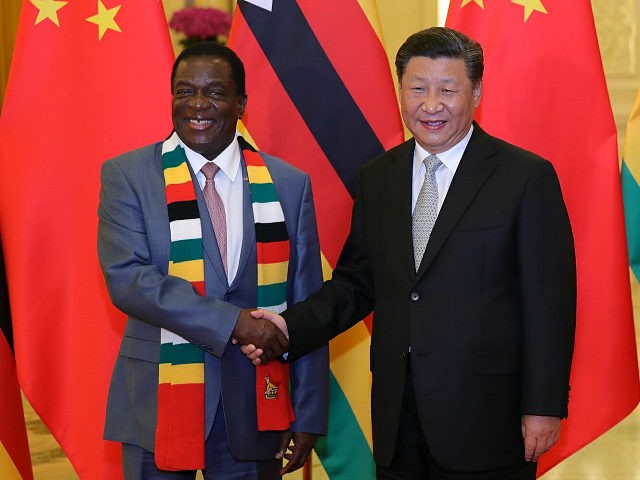Socialist Emmerson Mnangagwa’s regime in Zimbabwe signed a currency deal with China this week in a bid to stabilize its struggling economy and improve trade links around the world.
Under the new deal, Chinese investors will be able to pay Chinese-owned businesses in Zimbabwe looking for foreign exchange. Those businesses will then release the Zimbabwe dollar equivalent of the U.S. dollar to a local bank account of the payer in China.
The deal was announced by Zimbabwean Finance Minister Mthuli Ncube on Monday, who argued it would protect foreign investors from the country’s high rate of inflation.
“What this means is that there are those who will be investing in Zimbabwe from China,” he said. “Those who require their proceeds to be remitted back to China can now do so.”
Ncube added that the deal would consequently encourage Chinese investors to continue investing in Zimbabwe. “The idea is that those individuals will then swap currency so that those who are investing in Zimbabwe are able to give them a domestic currency and they use the foreign currency, which they are bringing in for investment, to pay those who are exiting,” he said.
The arrangement is further evidence that President Emmerson Mnangagwa will look to Beijing rather than the U.S. or Europe for financial support that will ease the pressure of Zimbabwe’s economic and humanitarian crisis. Last month, a report from the United Nations concluded that the country was on the brink of “man-made starvation” as a result of rising unemployment, rampant corruption, hyperinflation, and general government mismanagement.
Under the rule of Mnangagwa’s predecessor, the late dictator Robert Mugabe, Zimbabwe pursued a policy known as “Look East” that sought to build economic and diplomatic relationships with countries such as China to avoid economic sanctions over his regime’s egregious human rights violations.
As it has done in many parts of Africa, China has readily accepted the opportunity to invest in Zimbabwe as part of its “Belt and Road Initiative,” a global development strategy adopted by China in 2013 aimed at extending Beijing’s influence across the globe. A number of Chinese infrastructure projects are currently taking place in and around the capital of Harare, including the construction of a multi-million-dollar parliament building and the expansion of the city’s airport.
Zimbabwe has often proved to be a place of frustration for many Chinese investors because of the government’s failure to regularly meet its debt payments as well as difficulties in repatriating profits because of constantly rising inflation. However, China generally remains more than happy to allow countries to fall into debt traps because when countries such as Zimbabwe fail to meet payments, China can sweep up the collateral, allowing the communist regime to increase its economic and potential military influence around the world.
Follow Ben Kew on Facebook, Twitter at @ben_kew, or email him at bkew@breitbart.com.

COMMENTS
Please let us know if you're having issues with commenting.